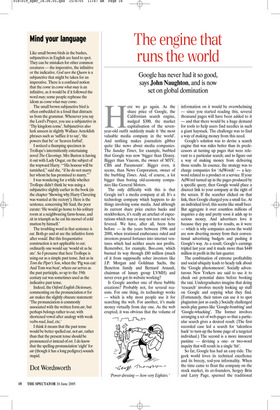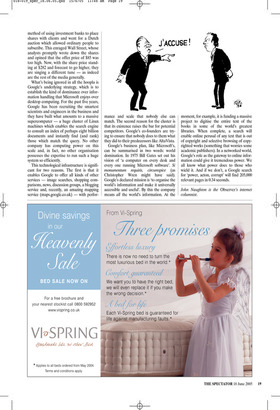The engine that runs the world
Google has never had it so good, says John Naughton, and is now set on global domination Here we go again. As the share price of Google, the Californian search engine, nudged $300, the market capitalisation of the sevenyear-old outfit suddenly made it ‘the most valuable media company in the world’. And nothing makes journalists gibber quite like news about media companies. The Sunday Times, for example, burbled that Google was now ‘bigger than Disney. Bigger than Viacom, the owner of MTV, CBS and Paramount’. Bigger even, it seems, than News Corporation, owner of the burbling Times. And, of course, a lot bigger than boring old-economy companies like General Motors.
The only difficulty with this is that Google isn’t a media company at all. It’s a technology company which happens to do things involving some media. And although its current share price excites hacks and stockbrokers, it’s really an artefact of expectations which may or may not turn out to be fevered. We have, after all, been here before — in the years between 1996 and 2000, when irrational exuberance ruled and investors poured fortunes into internet ventures which had neither assets nor profits. Remember, for example, Boo.com, which burned its way through £80 million (much of it from supposedly sober investors like J.P. Morgan and Goldman Sachs, the Benetton family and Bernard Arnault, chairman of luxury group LVMH) and never even got its website working?
Is Google another one of these bubble creations? Probably not, for several reasons. For one thing, its technology works — which is why most people use it for searching the web. For another, it’s made money virtually from day one. As the web erupted, it was obvious that the volume of information on it would be overwhelming — since you started reading this, several thousand pages will have been added to it — and that there would be a huge demand for tools to help users find needles in such a giant haystack. The challenge was to find a way of making money from this need.
Google’s solution was to devise a search engine that was miles better than its predecessors at turning up pages that were relevant to a particular search; and to figure out a way of making money from delivering those results. In essence, the strategy was to charge companies for ‘AdWords’ — a keyword related to a product or a service. If your AdWord turned up in the pages produced by a specific query, then Google would place a discreet link to your company at the right of the screen. If the searcher clicked on that link, then Google charged you a small fee. At an individual level, this seems like small beer. But aggregate it over countless millions of inquiries a day and pretty soon it adds up to serious money. And advertisers love it because they pay only for results, as it were — which is why companies across the world are now diverting money from their conventional advertising budgets and pushing it Google’s way. As a result, Google’s earnings tripled last year and it made more than $440 million in profit in the last quarter.
The combination of extreme profitability and social ubiquity leads to heady talk about the ‘Google phenomenon’. Socially adventurous New Yorkers are said to use it to check out potential dates before booking the taxi. Undergraduates imagine that doing ‘research’ involves merely looking up stuff on Google and copying what they find. (Fortunately, their tutors can use it to spot plagiarism just as easily.) Socially challenged nerds play games like ‘Google-bombing’ and ‘Google-whacking’. The former involves arranging a set of web-pages so that a particular search gives a desired result. (The first recorded case led a search for ‘talentless hack’ to turn up the home page of a targeted individual.) The second is a more innocent pastime — devising a oneor two-word inquiry that will result in a single ‘hit’.
So far, Google has had an easy ride. The geek world loves its technical excellence and its breezy, sod-you informality. When the time came to float the company on the stock market, its co-founders, Sergey Brin and Larry Page, spurned the traditional method of using investment banks to place shares with clients and went for a Dutch auction which allowed ordinary people to subscribe. This enraged Wall Street, whose analysts promptly wrote down the shares and opined that the offer price of $85 was too high. Now, with the share price standing at $282 and forecast to go higher, they are singing a different tune — as indeed are the rest of the media generally.
What’s being ignored in all the hoopla is Google’s underlying strategy, which is to establish the kind of dominance over information handling that Microsoft enjoys over desktop computing. For the past five years, Google has been recruiting the smartest scientists and engineers in the business and they have built what amounts to a massive supercomputer — a huge cluster of Linux machines which enables the search engine to consult an index of perhaps eight billion documents and instantly find (and rank) those which match the query. No other company has computing power on this scale and, in fact, no other organisation possesses the expertise to run such a huge system so efficiently.
This technological infrastructure is significant for two reasons. The first is that it enables Google to offer all kinds of other services — image searches, shopping comparisons, news, discussion groups, a blogging service and, recently, an amazing mapping service (maps.google.co.uk) — with perfor mance and scale that nobody else can match. The second reason for the cluster is that its existence raises the bar for potential competitors. Google’s co-founders are trying to ensure that nobody does to them what they did to their predecessors like AltaVista.
Google’s business plan, like Microsoft’s, can be summarised in two words: world domination. In 1975 Bill Gates set out his vision of ‘a computer on every desk and every one running Microsoft software’. Si monumentum requiris, circumspice (as Christopher Wren might have said). Google’s declared mission is ‘to organise the world’s information and make it universally accessible and useful’. By this the company means all the world’s information. At the moment, for example, it is funding a massive project to digitise the entire text of the books in some of the world’s greatest libraries. When complete, a search will enable online perusal of any text that is out of copyright and selective browsing of copyrighted works (something that worries some academic publishers). In a networked world, Google’s role as the gateway to online information could give it tremendous power. We all know what power does to those who wield it. And if we don’t, a Google search for ‘power, acton, corrupt’ will find 205,000 relevant pages in 0.34 seconds.

















































 Previous page
Previous page